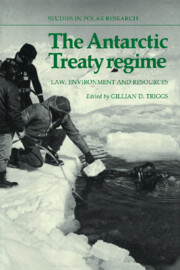Book contents
- Frontmatter
- Contents
- List of contributors
- List of Antarctic Treaty Parties
- Foreword
- Introduction
- Frontispiece: Map of national claims
- Part I Antarctica: physical environment and scientific research
- Part II The Antarctic Treaty regime: legal issues
- 4 Introduction
- 5 The Antarctic scene: legal and political facts
- 6 The Antarctic Treaty system: a viable alternative for the regulation of resource-oriented activities
- 7 The relevance of Antarctica to the lawyer
- 8 The Antarctic Treaty system: some jurisdictional problems
- Part III The Antarctic Treaty regime: protecting the marine environment
- Part IV The Antarctic Treaty regime: minerals regulation
- Part V Whither Antarctica? Future policies
- Part VI Conclusion
- Selected reading
- Appendix 1
- Appendix 2
8 - The Antarctic Treaty system: some jurisdictional problems
Published online by Cambridge University Press: 20 January 2010
- Frontmatter
- Contents
- List of contributors
- List of Antarctic Treaty Parties
- Foreword
- Introduction
- Frontispiece: Map of national claims
- Part I Antarctica: physical environment and scientific research
- Part II The Antarctic Treaty regime: legal issues
- 4 Introduction
- 5 The Antarctic scene: legal and political facts
- 6 The Antarctic Treaty system: a viable alternative for the regulation of resource-oriented activities
- 7 The relevance of Antarctica to the lawyer
- 8 The Antarctic Treaty system: some jurisdictional problems
- Part III The Antarctic Treaty regime: protecting the marine environment
- Part IV The Antarctic Treaty regime: minerals regulation
- Part V Whither Antarctica? Future policies
- Part VI Conclusion
- Selected reading
- Appendix 1
- Appendix 2
Summary
While seven states claim territorial sovereignty over all but a small wedge of the continent, other states, particularly those most active in the area, have refused to recognise these claims. The difficulties raised by conflicting juridical positions on Antarctic sovereignty have persistently retarded negotiations concerning Antarctic resource and environmental regulation. Indeed, the Antarctic Treaty and related Conventions and Recommendations are incomprehensible in the absence of some understanding of the legal positions of claimant and non-claiming Parties on the question of territorial sovereignty.
Despite the diametrically opposed arguments of states claiming territorial sovereignty in Antarctica and those denying it, and despite the complicating contentions of those states which deny existing claims but reserve their own rights to make claims in the future, legal and diplomatic techniques have succeeded in avoiding direct conflict over sovereignty. The debates in the First Committee of the General Assembly in 1984 demonstrate that most states, regardless of their ideological perspective, accept that the Antarctic Treaty regime has been a remarkably successful mechanism through which universal interests in preservation of the Antarctic environment, non-militarisation of the area, prohibition of nuclear explosions and radioactive waste disposal and free scientific access have been protected and advanced.
The precise claims to sovereignty which are made and the legal principles upon which they are based have been amply and frequently described. These claims are justly criticised as inappropriate principles for the determination today of territorial sovereignty in Antarctica. The fact remains, however, that claimant states continue to parade a conglomerate of asserted classical theories in support of their territorial acquisitions – geographical contiguity, discovery, acquiescence, recognition, spheres of influence, effective occupation or manifestations of sovereign activities.
- Type
- Chapter
- Information
- The Antarctic Treaty RegimeLaw, Environment and Resources, pp. 88 - 110Publisher: Cambridge University PressPrint publication year: 1987
Accessibility information
- 3
- Cited by

